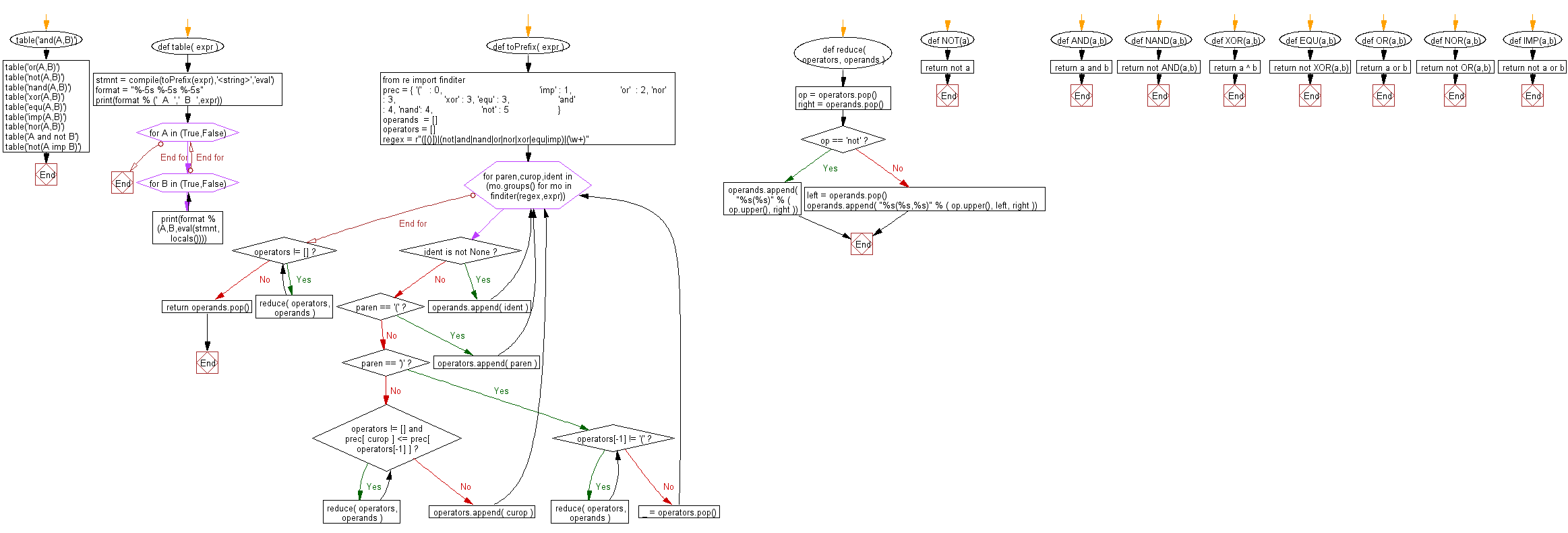Python Challenges: Print a truth table for an infix logical expression
Write a Python program to print a truth table for an infix logical expression.
Sample Solution:
Python Code:
def table( expr ):
"""
Ref.: https://bit.ly/3cWJD22
table('A and not B')
A B A and not B
True True False
True False True
False True False
False False False
table('not(A imp B)')
A B not(A imp B)
True True False
True False True
False True False
False False False
"""
# convert infix expression to prefix (function call) form
def toPrefix( expr ):
from re import finditer
# Pop and operator of the operators stack and one or two operands of the
# operand stack, and assembled into a call to the appropriate function.
# The function call is pushed onto the operand stack
def reduce( operators, operands ):
op = operators.pop()
right = operands.pop()
if op == 'not':
operands.append( "%s(%s)" % ( op.upper(), right ))
else:
left = operands.pop()
operands.append( "%s(%s,%s)" % ( op.upper(), left, right ))
prec = { '(' : 0, # operator precedence
'imp' : 1,
'or' : 2, 'nor' : 3,
'xor' : 3, 'equ' : 3,
'and' : 4, 'nand': 4,
'not' : 5
}
# operand and operator stacks
operands = []
operators = []
# Regular expression for parsing the infix expression. It has three
# parenthesized groups, which are returned in a tuple by the groups()
# method of a match object (mo). The tuple is unpacked into
# corresponding variables in the for-statement.
#
# paren | logical operators (curop) |ident
regex = r"([()])|(not|and|nand|or|nor|xor|equ|imp)|(\w+)"
for paren,curop,ident in (mo.groups() for mo in finditer(regex,expr)):
# identifiers (i.e., variable names) are pushed on the operand stack
if ident is not None:
operands.append( ident )
# left parens are pushed on the operator stack
elif paren == '(':
operators.append( paren )
# for a right paren, the stacks are reduced until the matching
# left paren is encountered. The left paren is discarded.
elif paren == ')':
while operators[-1] != '(':
reduce( operators, operands )
_ = operators.pop()
else:
# while the operator being parsed (curop) has a lower
# precedence than the one on the top of the operator stack,
# reduce the higher priority operator. Then push the curop
# onto the operator stack
while operators != [] and prec[ curop ] <= prec[ operators[-1] ]:
reduce( operators, operands )
operators.append( curop )
# after the input expression is exhausted, reduce the operands on the
# operand stack until it is empty
while operators != []:
reduce( operators, operands )
return operands.pop()
def NOT(a): return not a
def AND(a,b): return a and b
def NAND(a,b): return not AND(a,b)
def XOR(a,b): return a ^ b
def EQU(a,b): return not XOR(a,b)
def OR(a,b): return a or b
def NOR(a,b): return not OR(a,b)
def IMP(a,b): return not a or b
stmnt = compile(toPrefix(expr),'','eval')
format = "%-5s %-5s %-5s"
print(format % (' A ',' B ',expr))
for A in (True,False):
for B in (True,False):
print(format % (A,B,eval(stmnt,locals())))
table('and(A,B)')
table('or(A,B)')
table('not(A,B)')
table('nand(A,B)')
table('xor(A,B)')
table('equ(A,B)')
table('imp(A,B)')
table('nor(A,B)')
table('A and not B')
table('not(A imp B)')
Sample Output:
A B and(A,B) True True True True False False False True False False False False A B or(A,B) True True True True False True False True True False False False A B not(A,B) True True False True False True False True False False False True A B nand(A,B) True True False True False True False True True False False True A B xor(A,B) True True False True False True False True True False False False A B equ(A,B) True True True True False False False True False False False True A B imp(A,B) True True True True False False False True True False False True A B nor(A,B) True True False True False False False True False False False True A B A and not B True True False True False True False True False False False False A B not(A imp B) True True False True False True False True False False False False
Flowchart:

Python Code Editor:
Contribute your code and comments through Disqus.
Previous: Write a Python program to compute the person's itinerary.
Next: Write a Python program to generate list with 'width'-bit gray code.
What is the difficulty level of this exercise?
Test your Programming skills with w3resource's quiz.
